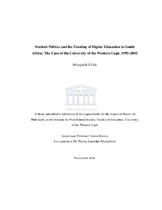| dc.description.abstract | This dissertation examines various ways in which the University of the Western Cape (UWC) in Cape Town, South Africa, confronted the paradoxical post-apartheid higher education policy of expansion of access to historically disadvantaged students and limited funds and how students addressed the resulting problem of ‘unmet financial need’. My case study is set within the broader context of the momentous political and social change in South Africa’s first decade of democracy and the transformation of higher education in that country between 1995 and 2005. I reconsider the general topics of student activism, student participation in university governance and student funding based on relevant and accessible scholarly literature. Eventually, Wright, Taylor and Moghaddam’s framework (1990) inspires a conceptual-analytical framework to be applied in the case study analysis, consisting of a typology of four ideal types of student action, namely, normative collective student action (Type 1), non-normative collective student action (Type 2), normative individual student action (Type 3) and non-normative individual student action (Type 4). I adopt a qualitative case study approach and use a variety of data collection methods (such as interviews, official documentation and observation) to construct a case study database. Interviewees include members of the university management, university staff and students (both leaders and ordinary students). I interview diverse students in terms of their origin, race, gender, fields of study and levels of qualification, and political orientation. The interviewees include former student leaders in order to gain a historical perspective on the pre-1994 era. Staff interviews target mainly those members who were directly involved with student financial issues or who were responsible for making student funding decisions. I collected different types of documents, including Student Representative Council (SRC) annual reports, minutes, discussion documents, university annual reports, and university financial statements. I also have opportunity to observe various student activities on campus, including student meetings and workshops, where student funding concerns are discussed. | en_US |

